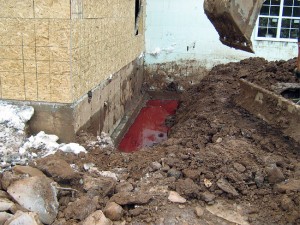 Many UK properties are served by domestic heating oil tanks usually situated in garden areas. The fuel within these tanks is normally kerosene.
Many UK properties are served by domestic heating oil tanks usually situated in garden areas. The fuel within these tanks is normally kerosene.
Leaks from domestic tanks usually emanate from either the tank, the fittings/valves or the supply line into the property. Leaks can be gradual over time or sudden and catastrophic.
The impact of a fuel leak can vary site to site. Where the leaked fuel impacts building structures and buried services (such as water supply pipes) there can be a significant impact on residents that may require the occupiers to be moved out of the property when clean up is undertaken. Where the leaking fuel may impact controlled waters (streams or underground water), action must be quickly taken to prevent the spread of the contamination.
In the event of a loss of fuel being noted, the following action is recommended (where safe to do so):
- Try and identify the source of the leak and stem the flow if possible and safe to do so;
- Where spilled fuel is on the ground, try to absorb this wherever possible and prevent the spread of spilled fuel to nearby buildings of watercourses;
- Identify whether any leaked fuel has migrated from your property and impacted third party land;
- Notify your insurer as soon as possible as they will mobilise accredited contractors to respond to the spill;
- Try and confirm the amount of fuel lost from the tank by examining records of previous usage and delivery dates;
- Where the leak is continuing, contact your fuel supplier to request they uplift the remaining fuel as quickly as possible;
- If the leak has impacted controlled waters (streams, ponds, lakes or underground water) contact the Environment Agency; and
- If the leak has impacted the building structure (for example if fuel vapours are present in the building) or if the drinking water supply has beeen tainted (tastes or smells of fuel), contact your local Environmental Health Officer.
It is worth noting that insurers will not always pay out for domestic heating oil spills. For example, if the fuel storage tank and pipes are in poor condition, obviously not maintained or worn out, the spill may not be classified as ‘sudden, accidental or unforeseen’.
Additionally, spills affecting only garden areas and not buildings or third party land may also not be covered. We always recommend contacting your insurer and confirming that cover is in place prior to commissioning any clean up works.
Any works on the domestic oil heating system (tank, lines and boiler) should always be carried out by an OFTEC qualified technician.







